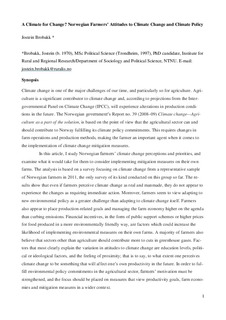| dc.description.abstract | Climate change is one of the major challenges of our time, and particularly so for agriculture. Agriculture is a significant contributor to climate change and, according to projections from the Intergovernmental Panel on Climate Change (IPCC), will experience alterations in production conditions in the future. The Norwegian government’s 2009 White Paper on climate policy for agriculture is based on the point of view that the agricultural sector can and should contribute to Norway fulfilling its climate policy commitments. This requires changes in farm operations and production methods, making the farmer an important agent when it comes to the implementation of climate change mitigation measures. In this article, I study Norwegian farmers’ climate change perceptions and priorities, and examine what it would take for them to consider implementing mitigation measures on their own farms. The analysis is based on a survey focusing on climate change from a representative sample of Norwegian farmers in 2011, the only survey of its kind conducted on this group so far. The results show that even if farmers perceive climate change as real and manmade, they do not appear to experience the changes as requiring immediate action. Moreover, farmers seem to view adapting to new environmental policy as a greater challenge than adapting to climate change itself. Farmers also appear to place production-related goals and managing the farm economy higher on the agenda than curbing emissions. Financial incentives, in the form of public support schemes or higher prices for food produced in a more environmentally friendly way, are factors which could increase the likelihood of implementing environmental measures on their own farms. A majority of farmers also believe that sectors other than agriculture should contribute more to cuts in greenhouse gases. Factors that most clearly explain the variation in attitudes to climate change are education levels, political or ideological factors, and the feeling of proximity; that is to say, to what extent one perceives climate change to be something that will affect one’s own productivity in the future. In order to fulfill environmental policy commitments in the agricultural sector, farmers’ motivation must be strengthened, and the focus should be placed on measures that view productivity goals, farm economies and mitigation measures in a wider context. | nb_NO |
